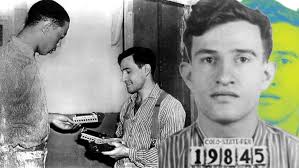Blissfully unable to understand the concept of dying, Joe Arridy was described by his prison warden as “the happiest man who ever lived on death row.”
Joe Arridy was a mentally handicapped young man who could easily be influenced. With an IQ of 46, he was prone to saying and doing whatever others suggested. Tragically, when the police coerced him into confessing to a gruesome murder he did not commit, his life was cut short.
The Crime
On the night of August 15, 1936, Dorothy Drain’s parents returned home in Pueblo, Colorado, to find their 15-year-old daughter dead in a pool of blood. She had been struck in the head while sleeping. Dorothy’s younger sister, Barbara, had also been attacked but miraculously survived. The brutal assault caused an uproar in the town, with newspapers declaring that a sex-crazed murderer was on the loose. Police began searching for any “Mexican”-looking men matching the description given by two other women who claimed to have been assaulted nearby.
Under immense pressure to catch the killer, Sheriff George Carroll felt relief when 21-year-old Joe Arridy, found aimlessly wandering near the local railyards, confessed to the crimes.
The Arrest Of Joe Arridy
Joe Arridy’s parents were Syrian immigrants, contributing to his dark complexion, which matched the description given by the women who were assaulted. In the newspapers, his “imbecility,” likely due to his parents being first cousins, was repeatedly emphasized.
Arridy had been committed to the Colorado State Home and Training School for Mental Defectives in Grand Junction at the age of 10. He was in and out of the home until he ran away after turning 21. Arridy spoke slowly, struggled with colors, and had difficulty repeating sentences longer than a couple of words. He was often coerced by other boys at the home, leading him to confess to things he could not possibly have done, such as stealing cigarettes.
Sheriff Carroll, aware of Arridy’s suggestibility, did not even bother to properly document Arridy’s confession. During the trial, even the prosecution acknowledged the need to forcefully extract information from Arridy. Carroll’s leading questions, such as asking Arridy if he liked girls and then immediately following up with “If you like girls so well, why do you hurt them?” were clearly manipulative.
It should have been clear to all involved that Joe Arridy was innocent, while another man, Frank Aguilar, was the likely culprit. Aguilar, a Mexican man, was found guilty and executed after being identified by Barbara Drain. Despite Aguilar’s execution, the public outrage in Pueblo persisted. Consequently, despite the testimony of three psychiatrists who declared Arridy mentally handicapped with an IQ of 46, he was found guilty and sentenced to death.
The Execution
Joe Arridy’s defense argued that he was not legally sane and therefore unable to distinguish right from wrong. Given his struggles to grasp simple concepts, like the difference between a stone and an egg, it seemed plausible that he did not understand right from wrong. Furthermore, Arridy seemed completely oblivious to the concept of death.
According to prison warden Roy Best, “Joe Arridy is the happiest man who ever lived on death row.” When informed of his impending execution, Arridy showed more interest in his toy trains. For his last meal, he requested ice cream. On January 6, 1939, Arridy, joyfully giving his beloved toy train to another inmate, was led to the gas chamber. As he was strapped into the chair, he grinned. His execution was swift, although Warden Best reportedly cried in the chamber.
Gail Ireland, the attorney who had petitioned for Joe Arridy’s pardon from the Colorado Supreme Court, wrote during the case, “Believe me when I say that if he is gassed, it will take a long time for the state of Colorado to live down the disgrace.”
It was not until 2011, over seven decades after Joe Arridy’s execution, that Colorado Governor Bill Ritter granted him a posthumous pardon. Governor Ritter stated, “Pardoning Arridy cannot undo this tragic event in Colorado history. It is in the interests of justice and simple decency, however, to restore his good name.”
Discover more disturbing cases, like the story of Willie Francis, the man who was executed twice. Reflect on the haunting last words of executed criminals throughout history.
